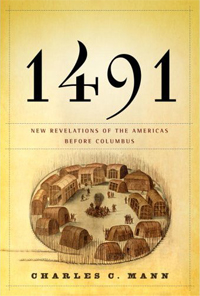 Somewhere between making paper pilgrim hats in elementary school, seventh grade American history, reruns of the Lone Ranger, and Mel Gibson’s Apocalypto we have created this picture of what the Americas were like. The entire continent was covered with pristine forests. The native peoples had remained unchanged since the paleolithic. The westerners won out because of the strength of their theology and the lethalness of their guns.
Somewhere between making paper pilgrim hats in elementary school, seventh grade American history, reruns of the Lone Ranger, and Mel Gibson’s Apocalypto we have created this picture of what the Americas were like. The entire continent was covered with pristine forests. The native peoples had remained unchanged since the paleolithic. The westerners won out because of the strength of their theology and the lethalness of their guns.
What if it all was a lie?
1491 is a work of painstaking journalism, questioning everything that pop culture holds dear about ancient America. It shatters myths and demonstrates that
– The Americas were far from sparsely populated, ready and waiting to be filled by white men.
– Squanto wasn’t selfless, he was a bit of a politician who had actually learned to plant seeds with dead fish while living as a slave in Europe.
– Bows and arrows were stronger, more deadly and more accurate than muskets
Along the way author Charles Mann makes a strong argument that America was more of a well-manicured garden, and the Amazon rainforest was an orchard. He demonstrates just how many people died from European disease. He even takes a stab at the genesis of the American ideals of liberty.
1491 is an engaging read that will give you newfound respect the land we live it, and a vision of how to make it great again.








 Tweets
Tweets